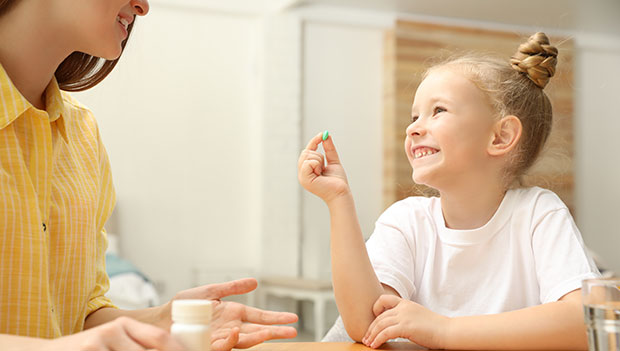
Preschool and Kindergarten Lunch | Best Lunchbox for Kids | Healthy Snacks for Kids | Best Water Bottle for Kids | Best Vitamins for Kids | Best Probiotics for Kids | Best Melatonin for Kids | Best Thermometer for Kids | Best Deodorant for Kids | Best Sunscreen for Kids
As a dietitian, I talk about probiotics daily. Probiotics are used for regulating the bowels when the stool is too loose or too hard. They are also used to help recover from or prevent colds, and they can even be used to treat anxiety and depression (although more research on that is pending). With the recent trend in probiotics, many parents might be wondering—should I give my child a daily probiotic?
The best probiotics for kids are gentler on the digestive system than adults. They contain healthy bacteria that can aid in digestion and immune system function. Most children can get the same probiotic benefits from eating the right food, but you may opt to add in a daily probiotic to their routine. So, in order to find the best options for kids, I collaborated with the experts at Active.com to find the 7 best probiotics for kids.
Why Trust Us?
ACTIVE.com's editorial team relies on the knowledge and experience of fitness and wellness. The health and safety of ACTIVE's readers is of the utmost importance to us. To ensure your well-being when consuming dietary supplements, the ACTIVE.com editorial team prioritizes products that are independently tested by a third party. We've consulted with a team of nutritionists and dieticians to ensure the products we feature are of the highest standard. This helps us create the most accurate, authentic review content for our readers.
Disclaimer: Exercise caution when ingesting supplements. Always make sure to consult with your doctor before ingesting a new supplement or pill.
The Best Probiotic for Kids - Our Top Picks
By clicking on the product links in this article, we may receive a commission fee at no cost to you, the reader. Sponsorships and affiliate commissions help support our research so we can help you find the best products. Read our full affiliate disclosure here.
- Best Overall Probiotics for Kids: Klaire Labs Ther-biotic Kids Chewable
- Best Chewable Probiotics for Kids: Protocol for Life Balance Chewable Probiotic
- Best Yogurt Probiotics for Kids: Lifeway Organic Whole Milk Kefir Smoothie
- Best Probiotic Gummies for Kids: SmartyPants Kids Probiotic
- Best Probiotics for Infants: Klaire Labs Ther-biotic for Infants and Children
- Best Probiotic Powder for Kids: Garden of Life Raw Probiotic Kids
- Best Organic Probiotics for Kids: Garden of Life Dr. Formulated Organic Kids
What Are Probiotics?
Sometimes these buzzwords start circulating and somehow end up even in your own vocabulary before you stop and think, "Wait a minute—what are probiotics anyway?"
Probiotics are the beneficial bacteria that colonize your colon. They hang out there and eat some of the food that comes through (i.e. prebiotics) and then repay you by manufacturing vitamin K, vitamin B12, thiamine, and riboflavin. They also help us digest our food, regulate our immune system, and protect against pathogenic bacteria which cause infection and disease.
Probiotic supplements contain between 1 and 15+ strains and species of bacteria. That doesn't remotely come close to the over 500 unique bacterial species partying in your intestinal discotheque, but probiotics go in as kind of a backup system. They bolster the front-end soldiers and help create an environment where the other bacterial species can increase in number.
Do I need a probiotic supplement? Probiotics are kind of like therapy: Most people could benefit from taking a bit. But no, you and your children can certainly get your probiotics from food (I included a list of some of the best probiotic foods at the end of this guide).
Best Overall Probiotics for Kids - Klaire Labs Ther-biotic Kids Chewable
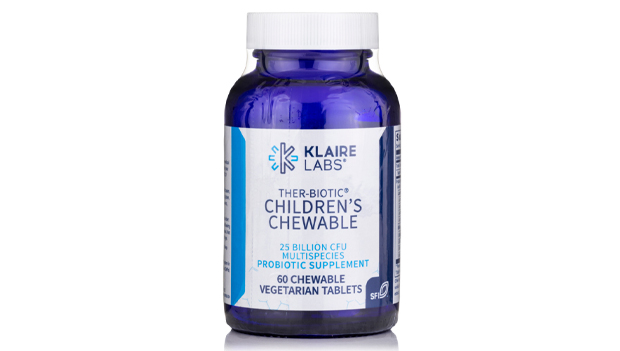
SPECS
- Type: Chewable
- Age recommendation: 2+
- Active ingredients: 25 billion CFU, 8 species
Klaire Labs comes in hard with this cherry-flavored chewable. While Klaire Labs recommends this product for ages two and up, keep in mind that it is still a small chewable and therefore a choking hazard for those under four years of age. Above four? You're golden. This supplement provides a combination of lactobacillus and bifidobacterium to keep the intestines feeling…well, appropriately quiet. I also like that it’s free of dairy, soy, wheat, and all the other top allergens, as well as artificial colors and flavors. It's small and has a light flavor.
The short shelf life of six months is a pain. But, that also speaks to the quality and minimal processing of this chewable. Like any flavored (or unflavored) product, the taste and texture will be based on personal preference (my favorite flavor is coming up next!)
What We Like
- Light cherry flavor, small size, one tablet daily
- 25 Billion CFU, 15 strains
- Allergen-free
What We Don't Like
- Short shelf-life
- High price point
BUY: Klaire Labs Ther-biotic Kids Chewable
Best Chewable Probiotics for Kids - Protocol for Life Balance Chewable Probiotic
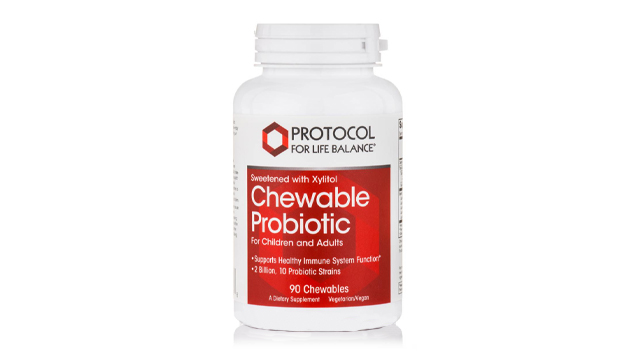
SPECS
- Type: Chewable
- Age recommendation: 2+
- Active ingredients: 2 Billion CFU, 10 Probiotic Strains
This is my personal favorite because it tastes like Smartees, making it a great chewable option for kids. Protocol for Life Balance advertises that these are good for ages 2+, but the same holds true as with the previous product. These require some advanced oral manipulation and some power on those molars. You can certainly pound these into a powder and mix it in a smoothie for younger kids, but keep chewable in their pure form for kids with all their teeth.
These pink, round tablets provide a good bacterial spread to keep your child’s intestines feasting nicely. This helps support your immune system and mood regulation too—did you know that 85-95 percent of the body's serotonin production is in the gut? That being said, it’s important to know that many of the benefits of probiotics are not as obvious—like mood regulation. Experimentation is key in finding the product that works best for you and your family.
What We Like
- 2 Billion CFU, 10 strains
- Great taste and texture
- Effective and helping improve tummy trouble
What We Don't Like
- Could be a choking hazard for smaller children
BUY: Protocol for Life Balance Chewable Probiotic
Best Yogurt Probiotic for Kids - Lifeway Organic Whole Milk Kefir Smoothie
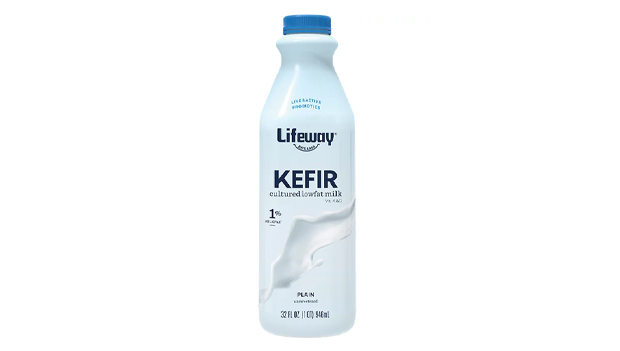
SPECS
- Type: Kefir–liquid
- Age recommendation: 6+ months
- Active ingredients: 25-30 Billion CFU, 12 strains
I'm going to give this one to you straight—some on the ACTIVE team thought we should include a baby yogurt here. After all, it was formulated for a baby and contains live active cultures like any yogurt. I'm throwing a curveball at you with this Lifeway Kefir. Kefir is a pourable yogurt cousin from the North Caucasus. It's popularity was spread to the rest of the world through Russia, which remains the main location for kefir production. Kefir contains many more bacteria than a standard yogurt, both in amount and diversity. I also like that there’s no added sugar.
This whole milk product provides important fat, but the main goal is the bacteria. So if your local grocery is out of the fully-leaded kefir, low-fat is ok too. Rather than giving this to your child straight up, try mixing it with a fruit puree, adding it to oatmeal, or including it in a smoothie. If you want to join me in my hippie kitchen, you'll use kefir as a starter for homemade yogurt. This can also be mixed with fruit puree or fruit juice and frozen into a popsicle for a bacteria-ful sweet treat on a hot day.
What We Like
- Widely available
- Versatile ingredient
- Low price point
What We Don't Like
- It has a strong tangy flavor, hence mixing it with fruit
- There is more than 1 step to this process
BUY: Lifeway Organic Whole Milk Kefir Smoothie
Best Probiotic Gummies for Kids - SmartyPants Kids Probiotic
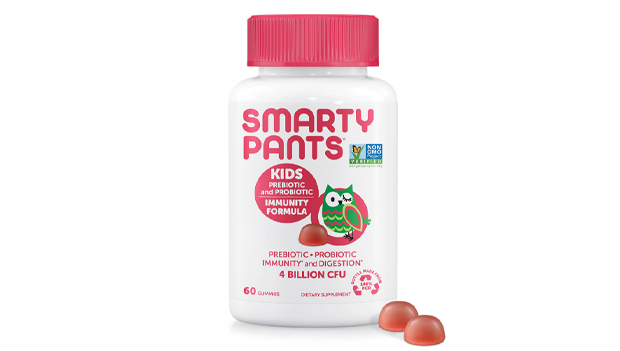
SPECS
- Type: Gummy
- Age recommendation: 3+
- Active ingredients: 4 billion CFU, 2 strains
Before reading further, you may want to hit up the Rolling Stones, because you can't always get what you want. Want a tasty gummy? Got you. Want a high quality probiotic? Sure. But both at the same time? It's not likely. This tasty and popular gummy probiotic features a nice dose at four billion CFU, but with only two strains of bacteria. That's because not every bacteria can survive in a gummy prison. Since the diversity here is low, you may want to support the effect of the gummies with a boost in probiotic foods.
Standard advice is that gummies are a choking hazard before the age of four, so proceed with caution. Another note is that there are three grams of added sugar to each gummy, bringing the total sugar to 6gm. I'm not one to shout about sugar, but I would rather it come in ice cream form as opposed to hiding in vitamin-like substances. On the other hand, real sugar may be easier on the tummy than some of the other options.
What We Like
- Tastes good
- Kids will be willing to eat it
- Good dose of probiotics in each 2-gummy serving
What We Don't Like
- Very limited bacterial diversity
- Extra heat sensitive; buy them in person or be ready when they are delivered
BUY: SmartyPants Kids Probiotic
Best Probiotics for Infants - Klaire Labs Ther-biotic for Infants and Children
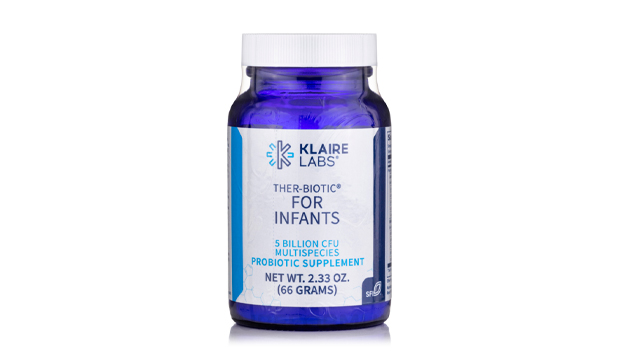
SPECS
- Type: Powder
- Age recommendation: 6 months and up
- Active ingredients: 5 Billion CFU, 10 strains
Klaire Labs Ther-biotic for Infants and Children is a potent and superfine powder that helps restore the gut microbiome of the infant. Their gut might be out of balance because of cesarean section delivery, method of feeding, medications, environmental exposures, and more. Babies with gas, constipation, or diarrhea may benefit. Infants with recurrent colds and ear infections certainly may benefit from a probiotic supplement.
There is now some research that made Klaire Labs pin the age recommendation at 6 months and up. The vast amount of probiotics available means that it's more difficult to control for safety, particularly for a product not regulated by any specific agency. Before starting any supplement with a baby, chat with the pediatrician or pediatric registered dietitian. If they recommend this product, you've got my thumbs up.
What We Like
- Superfine powder can blend into breastmilk or formula easily
- Great CFU and diversity of microbes in a 1¼ tsp serving
- 1 bottle contains 120 servings
What We Don't Like
- Short shelf life at 6 months
- High price point
BUY: Klaire Labs Ther-biotic for Infants and Children
Best Probiotic Powder for Kids - Garden of Life Raw Probiotic Kids
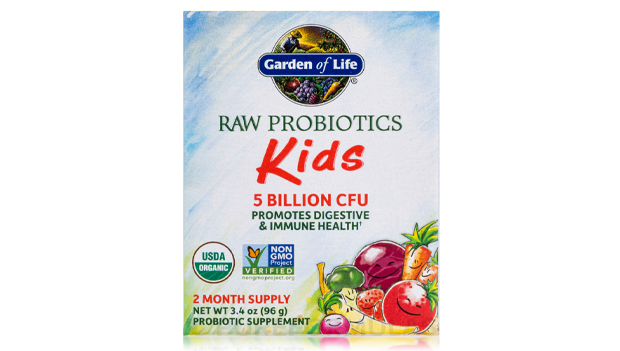
SPECS
- Type: Powder
- Age recommendation: 3 months and up
- Active ingredients: 5 Billion CFU, 5 strains, prebiotic blend
Garden of Life Raw Probiotic provides powder-ful pre- and probiotic action in 60 three-quarter teaspoon servings. The prebiotic fibers from a variety of roots, fruits, leaves, and more serve to feed the probiotics on their colonizing mission and to help sustain the colon-based immunity army fighting below. This powder can be mixed into formula, milk, smoothies, purees, or sprinkled over a bowl of Cheerios for that matter. Just be sure to drink the milk at the bottom of the bowl.
However, you might have trouble with the powder not adequately dissolving into cold liquids. So it's best to add this to room temperature or slight warm food situations for the best result.
What We Like
- Versatility—mix it, blend it, or sprinkle it
- Provides prebiotics to further support gut health
- Good for babies 3 months and up
What We Don't Like
- Mild banana flavor might not be for everyone
BUY: Garden of Life Raw Probiotic Kids
Best Organic Probiotics for Kids: Garden of Life Dr. Formulated Organic Kids
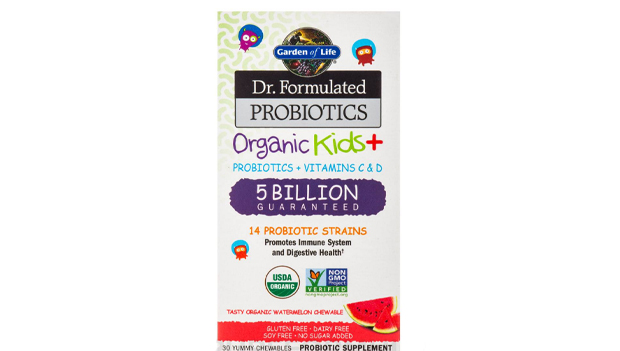
SPECS
- Type: Chewable
- Age recommendation: 4 years and older
- Active ingredients: 5 Billion CFU, 14 strains, 30mg vitamin C, 400 IU vitamin D
Garden of Life makes the list again with this Dr. Formulated Organic Kids chewable wafers. One wafer, cherry flavor, provides a surprising five Billion CFU in a quite diverse 14 strains. Vitamin C and vitamin D are also unique additions! This chewable actually provides 100 percent of the current recommendation for those nutrients for kids four to eight years old.
As with any flavored (or unflavored) product, some may not appreciate the taste. This bright cherry flavor is reported to come with a chalky feel. The size of the tablet was difficult for some smaller kids to manage. Despite that, many report lessening of their uncomfortable GI symptoms.
What We Like
- Includes prebiotics as well as vitamins C and D
- Potent dose with diverse bacteria
- No added sugar
What We Don't Like
- Difficult for kids to chew
- Chalky texture
BUY: Garden of Life Dr. Formulated Organic Kids
Are Probiotics Safe for Kids?
Probiotics occur naturally in many foods. These are safe for kids unless there’s an allergy or sensitivity to the food. Supplements are also safe, but there are certain strains that are necessary for kids while others benefit adults more. There is also the issue of dosage.
Some probiotics contain a fairly low dose, such as 1,000 CFU while others may provide 25 times that amount. Stick with a kids' probiotic supplement and the dose should be just right. If you have any questions or concerns, discuss them with your pediatrician or touch base with a pediatric dietitian.
How to Choose the Best Probiotic for Kids
Below, I included a few criteria for helping spot the best probiotic for kids.
Storage
- Pre-retail: Probiotics are sensitive to heat and time, so purchase from a place that has a high supplement turnover. If purchasing online, see if you can purchase directly from a supplement company rather than a standard retailer.
- Retail location: Some probiotic products are shelf-stable, but I still prefer the ones kept in the fridge. You never know how long it's been sitting and what the temperature was.
Strains and Species
Species are two different bacteria, Lactobacillus acidophilus and Bifidobacterium longum, for example. Strains are the same species, but provide some different benefits, like Staphylococcus aureus and Staphylococcus epidermidis. Certain strains and species can be used to target specific health concerns, but for your standard broad spectrum coverage, pick a product that has a lot going on. Some of the products on this list have 10+ species and strains, each doing its own part.
Deadweight or Part of the Routine?
If you're going to drop $57.95 on a fancy bottle while you neglect it for the next five years, that's not the product for you. Buy something and test it out. If it doesn't work for your family due to texture or flavor reasons, try something else. Meet up with some friends and do a probiotic tasting! It's all the rage. You heard it here first.
FAQs About Probiotics for Kids
Should kids take probiotics?
Kids should have probiotics in their life. Whether that comes from food sources or a supplement, it's a good idea. By meal planning, you can map out where to add in yogurt or kimchi to make sure your family gets enough bacterial exposure.
Should kids have probiotics daily?
Ideally, kids do have probiotics in their lives on a daily basis. It's easy when you know how many foods have probiotic benefits and how versatile they can be—like miso salad dressing. Whether or not a specific child should be taking a daily probiotic is a good conversation to have with your child’s pediatrician who is also familiar with their medical history.
Do probiotics actually work?
If probiotics worked exactly the way we think they do, we wouldn't have to take them over and over again to get that benefit. There’s a lot of research now on cultures and their intake of fermented foods, and how that affected their health. We have long histories of kefir and sauerkraut to draw on. They do work, but researchers are still figuring out many of the details.
What foods are high in probiotics?
- Yogurt–the word is actually legally defined in the US. They all have live active bacteria.
- Kefir
- Sauerkraut
- Tempeh
- Kimchi
- Miso
- Kombucha
- Traditionally pickled pickles
- Traditional buttermilk (not cultured buttermilk)
- Natto
- Soft cheese, like Gouda
- Sourdough bread
- Apple cider vinegar
These statements have not been evaluated by the Food and Drug Administration. This product is not intended to diagnose, treat, cure, or prevent any disease.
Preschool and Kindergarten Lunch | Best Lunchbox for Kids | Healthy Snacks for Kids | Best Water Bottle for Kids | Best Vitamins for Kids | Best Probiotics for Kids | Best Melatonin for Kids | Best Thermometer for Kids | Best Deodorant for Kids | Best Sunscreen for Kids









Discuss This Article